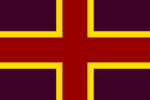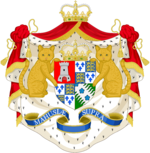Confederation of Mahuset
This article needs to be updated. |
Confederation of Mahuset Confederatie Mahuset | |
|---|---|
| Motto: "Mahusiæ supra" (Pseudo-Latin) | |
| Anthem: "And the Waltz Goes On" | |
| Capital | Lazia |
| Official languages | English and Dutch |
| Religion | Secular |
| Demonym(s) | Mahusetan |
| Government | Federal constitutional presidential republic |
• President | Emiel Sebastiaan Hardy |
• Prime Minister | Stephen Freayth |
| Legislature | Lazian Chamber |
| Establishment | 3 January 2016 |
| Population | |
• Census | 23 |
| Currency | Mahusetan leo (MIL, ƒ) |
| Time zone | GMT (GMT+6 in Virgo and Starnia, GMT+3 in Matsio Anatolia, GMT+2 in Morburn, GMT+1 in Dutch Matsia, Alkmaar, Geestmerambacht, Noorderhout, Ihuset and Lazia, GMT±00:00 in British Matsia and Mamucium, GMT-5 in Lundenland) |
Website Official website | |
Mahuset[note 1], officially the Confederation of Mahuset (Dutch: Confederatie Mahuset), is a self-declared independent nation-state, commonly referred to by external observers as a micronation, established on the 3 January 2016. It claims territories in Europe and Asia: the states of Matsia, Alkmaar, Geestmerambacht, Noorderhout, and Ihuset, as well as the district of Lazia and the territories of Lundenland and Mamucium, make up mainland Mahuset in Northern Europe, and the territories of Starnia and Virgo make up Mahusetan Hasanistan in Central Asia. It is frequently ranked amongst the world's least corrupt nations, and is regarded as a minor micronational diplomatic, cultural, and political power.
Mahuset is a federal state and a constitutional presidential republic, whose parliament is known as the Lazian Chamber, so called after the capital city of Lazia. It is lead by President Emiel Sebastiaan Hardy (as head of government and head of state) and Prime Minister Stephen Freayth (as deputy head of government and head of state). While the laws of the states are subordinate to federal law, the federal government does not have any regulations on the means for administering states and as such the states all have their own unique system of government. Mahuset has a free market capitalist economy, but also a high level of income equality, due to its small, mostly middle-class population.
The current Confederation of Mahuset is the successor (in law, in dignity, and in territory) to the Kingdom of Mahuset and the majority of its predecessors: the Empire of Alkmaar, the Co-Kingdom of Krasota, the Royal Union of Mahuset, the Kingdom of Ihuset, the Kingdom of Matsia, the United Nations of Mahuset, and the various Cookielandic and Kittylandic States, but not the Kingdom of Radon, which was succeeded instead by the Principality of Radon. It has had a long and turbulant history, having gone through several changes in government, dis- and reestablishments, and changes in territory before reaching its current shape and state of relative stability.
Mahuset is a "fifth world" micronation, with the highest assigned score of 12 under the Boodlesmythe-Tallini System, and a score of 4.4 on the Categoric-Gradial System, also known as Linden's (Revised) System.
Etymology
Although the exact etymology of the name "Mahuset" has been lost to the mists of time, there are two prominent theories on its etymology. The most commonly accepted etymology is for it to have originated as a portmanteau of Matsia and Ihuset, which are the two nations which merged to form the Kingdom of Mahuset, the Confederation of Mahuset's predecessor. A much less commonly accepted, yet still prominent etymology is for it to have originated as a portmanteau of "muh", an internet slang term for "my", and "huset", Norwegian for house.
Geography
Biodiversity
Mahuset can be subdivided between a number of ecoregions because of its climate and geomorphology, the Mahusetan mainland finds itself in the Atlantic mixed forests ecoregion. The country is consequently one of the richest in Europe in terms of biodiversity, this is however because of the large geographical spread of different Mahusetan territories.
Flora and Fauna
Mahuset's wildlife is typical of the north-west of Europe, although several of the larger mammals such as the lynx, brown bear, wolf, elk and walrus were hunted to extinction in historic times. There are important populations of seals and internationally significant nesting grounds for a variety of seabirds such as European herring gulls.
Politics and Government
Mahuset is a federal, presidential, representative democratic republic with strong democratic traditions, with Lazia as its capital. The Mahusetan political system operates under a framework laid out in the 2019 constitutional document known as the Constitution of the Confederation of Mahuset. Amendments generally require a two-thirds majority of the Lazian Chamber; the fundamental principles of the constitution, as expressed in the articles guaranteeing human dignity, the separation of powers, the federal structure, and the rule of law are valid in perpetuity.
The head of state, head of government and commander-in-chief of the armed forces is the president, who is elected by popular vote on the same ticket as the prime minister. The president has authority over the Lazian Chamber. The president appoints the members of the executive office as his cabinet, with members being responsible for policy and administration. The deputy head of state is the prime minister, whose powers are largely ceremonial and are, in reality, only wielded in the absence or inability of the president, with the prime minister succeeding the president in case of the president being unable to carry out his duties as president, whether through sickness, death, or other means.

Federal legislative power is vested in the Lazian Chamber consisting of the Lazian Council and the Executive Office of the Lazian Chamber, which together form the legislative and executive body. The Lazian Council is elected through direct elections, by Schulze STV. The members of the Lazian Council represent the governments of the six constituent states, one constituent district, and four constituent territories.
Since 2019, the party system has been dominated by the Classical Liberal Party and the Independent Chamber Group. So far every president has been a member of one of these parties. However, the social democratic Social Democratic Party (in the Lazian Chamber between 2016 and 2019), the smaller social liberal Social Liberal Party (in the Lazian Chamber between 2016 and 2020) and the Mahusetan Pirate Party (in the Lazian Chamber between 2017 and 2019) have also played important roles.
Limited direct democracy is a hallmark of the Mahusetan political system. The 2016 and 2019 Mahusetan Constitutions define a system of direct democracy (sometimes called half-direct or representative direct democracy because it is aided by the more commonplace institutions of a representative democracy). The instruments of this system at the federal level, known as popular rights, include the right to submit a federal initiative and a referendum, both of which may overturn parliamentary decisions.
By calling a federal referendum, a group of citizens may challenge a law passed by the Lazian Chamber, if they gather the signatures of 2⁄5 of the Mahusetan population against the law within 100 days. If so, a national vote is scheduled where voters decide by a simple majority whether to accept or reject the law. The Lazian Chamber and the President both have the power to introduce federal referendums, which unlike referendums proposed by the general population, have the ability to introduce laws as well as challenge them.
Political Parties
As the Confederation of Mahuset is a multi-party democracy, political parties in Mahuset are very common. Since the foundation of the Mahusetan government on 8 January 2016, the Mahusetan political system has been dominated by three families of political parties: the strongest of which are the Liberals, currently represented by the Classical Liberal Party (CLP); second are the Independents, currently represented by either Independent MPs in the Lazian Chamber or the Independent Chamber Group (OKF) and third are the Social Democrats and the Christian Democrats, both represented by the Social Democratic Party (SDP). Presently, there are four political parties operating in the Confederation of Mahuset and each have their own seats in the Lazian Chamber.
| Party | Logo | Ideology | Spectrum | Leader | Foundation | LC seats | ||
|---|---|---|---|---|---|---|---|---|
| Classical Liberal Party | CLP | Classical liberalism | Centre-right | Emiel Sebastiaan Hardy | 18 July 2016 | 2 / 5
| ||
| Independent Chamber Group | OKF | Big tent, Centrism | Centre | Shady Hosam Morsi | 4 February 2019 | 2 / 5
| ||
| Social Democratic Party | SDP | Social democracy, Christian democracy | Centre-left | Zabëlle Skye | 16 October 2016 | 1 / 5
| ||
References
Footnotes
- ↑ A former but largely unused alternative spelling was "Mahus'ed".
Attribution
 This article contains text available under the CC BY-SA 4.0 licence. Various Authors. "Wikipedia, the free encyclopedia". Retrieved 2019-01-05.
This article contains text available under the CC BY-SA 4.0 licence. Various Authors. "Wikipedia, the free encyclopedia". Retrieved 2019-01-05. This article contains text available under the CC BY-SA 4.0 licence. Various Authors. "Wikipedia, de vrije encyclopedie". Retrieved 2019-01-05.
This article contains text available under the CC BY-SA 4.0 licence. Various Authors. "Wikipedia, de vrije encyclopedie". Retrieved 2019-01-05.
External links
- Mahusetan Government Portal
- Mahusetan Discord Server
- Mahusetan Subreddit
- Mahusetan Facebook Page
- Mahusetan Twitter Account


